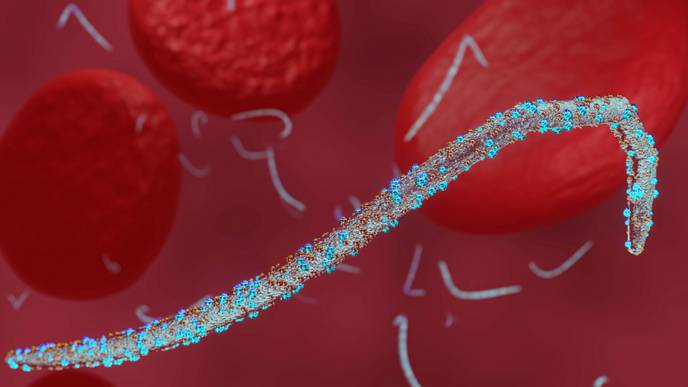Working Together Against Deadly Marburg Virus

12/20/2023
The Marburg virus is one of the most dangerous pathogens for humans. According to the World Health Organization (WHO), the mortality rate ranges between 24% and 88%, depending on the strain of the virus and the quality of the medical care. Like Ebola virus, it is an RNA virus of the filovirus family.
The first cases of the Marburg virus disease were documented in 1967. Since then, there have been several outbreaks in eastern, central and southern Africa. In 2021 for the first time the virus emerged in West Africa and this year in Tanzania and Equatorial Guinea. Marburg virus disease is a zoonosis as the initial transmission usually comes from animals: the natural hosts of this virus are presumably fruit bats. Marburg virus is transmitted between humans through body fluids, possibly also through semen.
So far only supportive treatment
To date, there are no effective antiviral drugs or vaccines, and Marburg virus disease can only be treated supportively. Therefore, any epidemic causes unacceptable suffering in the affected countries and has the potential to further spread the virus. Thus, development of treatments or vaccines are needed.
Innovative vaccine development and preclinical test pipeline
Two vaccines against Marburg viruses are currently in Phase I clinical trials. However, they only target a single antigen of the virus. This could impair their protective effect. Thus, exploring new strategies, the MARVAX consortium will develop novel vaccine candidates based on two different viral vectors that will express multiple Marburg virus antigens. Both combined approaches are expected to maximise the immunogenicity and protective effect of the vaccine candidates.
Above all, theMARVAX consortium is joining forces with experts in vaccine development and production, virology, and immunology to go significantly beyond previous research approaches. The novel vaccine candidates against Marburg viruses will be generated by the CSIC National Centre for Biotechnology (CNB-CSIC) and the Institut Pasteur, and their immunogenicity and efficacy will be evaluated in animal models by BNITM, CNB-CSIC and Institut Pasteur in close collaboration. CZ vaccines will develop the manufacturing process and generate clinical batches of the best-in-class vaccines that will be ready for future phase I clinical trials.

Facebook Comments